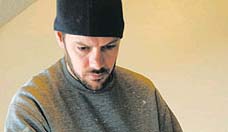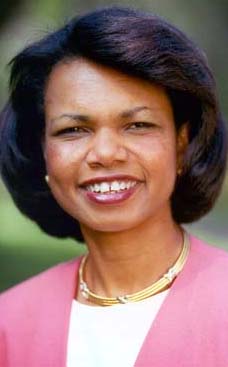2006.03.14: March 14, 2006: Headlines: Language: Training: Washington Post: Teaching of 'Critical Languages' hampered by lack of teachers
Peace Corps Online:
Peace Corps News:
Library:
Peace Corps: Language and Linguistics:
Peace Corp: Langauge and Linguistics: Newest Stories :
2006.03.14: March 14, 2006: Headlines: Language: Training: Washington Post: Teaching of 'Critical Languages' hampered by lack of teachers
Teaching of 'Critical Languages' hampered by lack of teachers

On Jan. 5, President Bush proposed the National Security Language Initiative, a $114 million effort to close the gap. "Deficits in foreign language learning and teaching negatively affect our national security, diplomacy, law enforcement, intelligence communities and cultural understanding," a U.S. Department of State fact sheet on the initiative states. "It prevents us from effectively communicating in foreign media environments, hurts counter-terrorism efforts, and hamstrings our capacity to work with people and governments in post-conflict zones and to promote mutual understanding."
Teaching of 'Critical Languages' hampered by lack of teachers
Strides in 'Critical Languages' Remain Small
Chance Availability of Teachers Often Determines Whether Arabic, Chinese, Other Classes Are Offered
By Jay Mathews
Washington Post Staff Writer
Tuesday, March 14, 2006; Page A04
Montgomery County has more than 44,000 students taking foreign languages, a rich linguistic feast that puts it No. 1 among U.S. school systems of similar size. Yet it has only one high school Arabic class and would not have that if special education teacher Nazeh Natur hadn't come to Gaithersburg High School.
When Gaithersburg lost its Arabic teacher last year, the head of the language department persuaded Natur to add that class to his busy schedule. An Israeli Arab who is a U.S. citizen, Natur once taught Arabic to young Jews and Hebrew to young Arabs. Now from 7:20 to 8:15 a.m. each weekday, he cajoles a dozen U.S. teenagers in Room C-16 to follow the twists and turns of his complicated mother tongue.
His students, he said, "complain that the words are too rich, that they can't get just one meaning for one word." He tells them "you have to be sensitive to what you say" because the wrong word can cause trouble.
The United States is in trouble, many foreign policy experts say, because it does not have enough speakers of what have come to be called critical languages: Arabic, Chinese, Russian, Japanese, Farsi, Hindi and others spoken in countries vital to U.S. interests.
On Jan. 5, President Bush proposed the National Security Language Initiative, a $114 million effort to close the gap. "Deficits in foreign language learning and teaching negatively affect our national security, diplomacy, law enforcement, intelligence communities and cultural understanding," a U.S. Department of State fact sheet on the initiative states.
"It prevents us from effectively communicating in foreign media environments, hurts counter-terrorism efforts, and hamstrings our capacity to work with people and governments in post-conflict zones and to promote mutual understanding."
But for the near future, the growth of so-called critical languages will often depend on happenstance, such as Natur's fortuitous appearance at Gaithersburg High.
Or on whether College Gardens Elementary School in Rockville gets its renovation done in time.
It is not often that a parent's appeal for an elementary school remodeling invokes national economic competitiveness. But that's what happened when College Gardens parent Cindy Boeke denounced a threat to funding of the renovation.
Space needed to be set aside for the school's mandarin Chinese immersion program at a time when "our nation needs this capability to remain competitive in the global economy," Boeke said in a petition signed by 62 people.
The Bush proposal includes money for grants to schools, study abroad and summer training, and stipends for foreign teachers to come to the United States. Still, many educators say language offerings ebb and flow because of changing student choices and availability of teachers.
"In the past decade, we offered Japanese at one of our high schools, but our teacher moved to Japan, and we could not find a qualified replacement," said Steve Johnson, director of curriculum and instruction for Carroll County, Md., schools.
The system will offer an introductory Russian course at one of its high schools next school year. "We are able to do that because we have a native Russian teacher who is certified in Latin and Russian, and she wishes to offer a course to students," Johnson said.
And although the war on terrorism has sharpened the government's interest in funding Arabic studies, the experiences of Washington area schools indicate that such classes are often born out of very different motives. Fairfax County foreign language coordinator Paula Patrick said Stuart and Annandale high schools started Arabic classes in the late 1990s because they had many students whose families came from countries where Arabic was the most common language. Students and parents were interested in improving their reading and writing of a language important to their families, not to prepare for jobs in national security or international business.
Natur's Arabic class at Gaithersburg has students with similar motives. Half come from families that speak Arabic or use a language, such as Farsi, that shares its alphabet. Two of the girls in class wore head scarves used by Muslim women, and much of the discussion was about proper terms to use in social occasions, not geopolitics.
The teacher, who recently received a doctorate in school psychology from Howard University, used flashcards, overhead-projector lessons and mnemonic devices. His 585-page Yale University Press textbook, arranged in what American readers would call back to front, encourages students not to be put off by the intricate and unfamiliar letters:
"Although Arabic script might seem exotic and undecipherable at first encounter," textbook author Mahdi Alosh wrote, "it is in fact quite consistent and, to the pleasant surprise of most learners, can be acquired quickly and easily."
Natur said more students have expressed interest in next year's Arabic class, and he thinks he can add a third year of instruction to the two years he's now handling. For now, the class is made up of a dozen students in a Spanish-language classroom that could hold more than twice as many.
"You do run a risk, when you have a class in a lesser-known language," Gaithersburg High Principal Darryl Williams said. "But the students talk to each other, and if they like what they hear, they say, 'This is interesting.' "
When this story was posted in March 2006, this was on the front page of PCOL:





Peace Corps Online The Independent News Forum serving Returned Peace Corps Volunteers
 | Re-envision Peace Corps
Slavery was once called "the peculiar institution," but a better candidate for this title may be the Peace Corps. Current geopolitics make this a good time to probe Peace Corps' peculiarity, as prelude to a long overdue reconceptualization of what is arguably the most underused federal entity. An imaginatively reinvented Peace Corps could powerfully promote US interests in a period when perceptions of American motives are increasingly relevant to global realignment.
Read a call to "Re-envision Peace Corps" by Nicholas J. Slabbert and PC Country Director J.R. Bullington. Their study envisions a new role for the Peace Corps in five linked areas: (1) reinventing America's international profile via a new use of soft power; (2) moving from a war-defined, non-technological, reactive theory of peace to a theory of peace as a normal, proactive component of technologically advanced democracy; (3) reappraising Peace Corps as a national strategic asset whose value remains largely untapped; (4) Peace Corps as a model for the technological reinvention of government agencies for the 21st century; (5) redefining civil society as information technology society. |
 | The Peace Corps Library
The Peace Corps Library is now available online with over 40,000 index entries in 500 categories. Looking for a Returned Volunteer? Check our RPCV Directory. New: Sign up to receive PCOL Magazine, our free Monthly Magazine by email. Like to keep up with Peace Corps news as it happens? Sign up to recieve a daily summary of Peace Corps stories from around the world. |
 | Invitee re-assigned after inflammatory remarks
The Peace Corps has pulled the invitation to Derek Volkart to join the Morocco Training Program and offered him a position in the Pacific instead after officials read an article in which he stated that his decision to join the Peace Corps was in "response to our current fascist government." RPCV Lew Nash says that "If Derek Volkart spoke his mind as freely in Morocco about the Moroccan monarchy it could cause major problems for himself and other Peace Corps volunteers." What do other RPCVs think? |
 | March 1, 1961: Keeping Kennedy's Promise
On March 1, 1961, President John F. Kennedy issues Executive Order #10924, establishing the Peace Corps as a new agency: "Life in the Peace Corps will not be easy. There will be no salary and allowances will be at a level sufficient only to maintain health and meet basic needs. Men and women will be expected to work and live alongside the nationals of the country in which they are stationed--doing the same work, eating the same food, talking the same language. But if the life will not be easy, it will be rich and satisfying. For every young American who participates in the Peace Corps--who works in a foreign land--will know that he or she is sharing in the great common task of bringing to man that decent way of life which is the foundation of freedom and a condition of peace. " |
 | Paid Vacations in the Third World?
Retired diplomat Peter Rice has written a letter to the Wall Street Journal stating that Peace Corps "is really just a U.S. government program for paid vacations in the Third World." Director Vasquez has responded that "the small stipend volunteers receive during their two years of service is more than returned in the understanding fostered in communities throughout the world and here at home." What do RPCVs think? |
 | RPCV admits to abuse while in Peace Corps
Timothy Ronald Obert has pleaded guilty to sexually abusing a minor in Costa Rica while serving there as a Peace Corps volunteer. "The Peace Corps has a zero tolerance policy for misconduct that violates the law or standards of conduct established by the Peace Corps," said Peace Corps Director Gaddi H. Vasquez. Could inadequate screening have been partly to blame? Mr. Obert's resume, which he had submitted to the Peace Corps in support of his application to become a Peace Corps Volunteer, showed that he had repeatedly sought and obtained positions working with underprivileged children. Read what RPCVs have to say about this case. |
 | Why blurring the lines puts PCVs in danger
When the National Call to Service legislation was amended to include Peace Corps in December of 2002, this country had not yet invaded Iraq and was not in prolonged military engagement in the Middle East, as it is now. Read the story of how one volunteer spent three years in captivity from 1976 to 1980 as the hostage of a insurrection group in Colombia in Joanne Marie Roll's op-ed on why this legislation may put soldier/PCVs in the same kind of danger. Latest: Read the ongoing dialog on the subject. |
 | Friends of the Peace Corps 170,000 strong
170,000 is a very special number for the RPCV community - it's the number of Volunteers who have served in the Peace Corps since 1961. It's also a number that is very special to us because March is the first month since our founding in January, 2001 that our readership has exceeded 170,000. And while we know that not everyone who comes to this site is an RPCV, they are all "Friends of the Peace Corps." Thanks everybody for making PCOL your source of news for the Returned Volunteer community. |
Read the stories and leave your comments.

Some postings on Peace Corps Online are provided to the individual members of this group without permission of the copyright owner for the non-profit purposes of criticism, comment, education, scholarship, and research under the "Fair Use" provisions of U.S. Government copyright laws and they may not be distributed further without permission of the copyright owner. Peace Corps Online does not vouch for the accuracy of the content of the postings, which is the sole responsibility of the copyright holder.
Story Source: Washington Post
This story has been posted in the following forums: : Headlines; Language; Training
PCOL32073
47
















